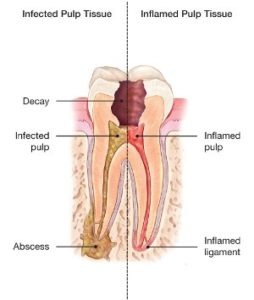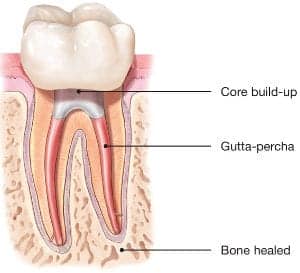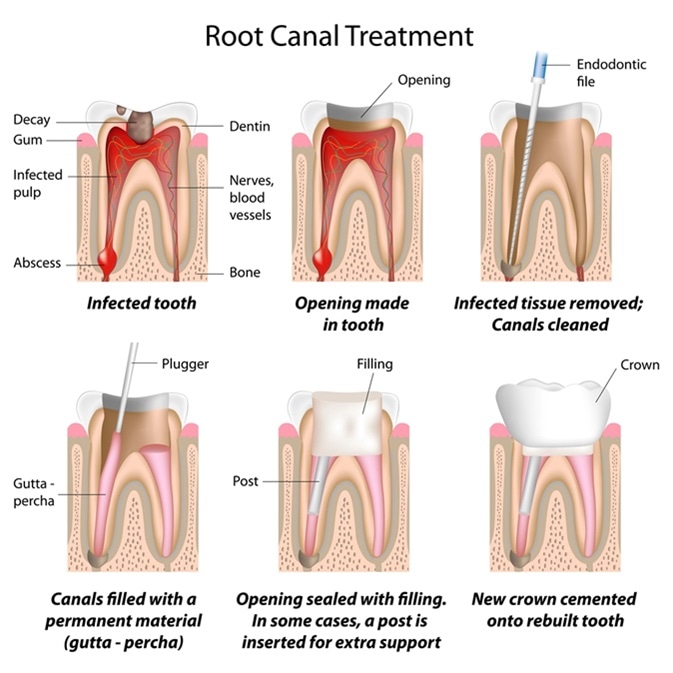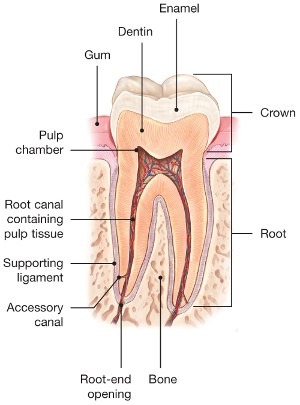Have you ever wondered what exactly a root canal is? It’s a common dental procedure that involves removing the infected pulp from inside a tooth, cleaning and disinfecting it, and then filling and sealing it to prevent reinfection. This article from the American Association of Endodontists provides an explanation of what a root canal is, the reasons for needing one, the benefits of the treatment, and other endodontic options available. The article also addresses common concerns such as the pain associated with the procedure, recovery time, and cost. Don’t worry, a root canal isn’t as daunting as it may seem, and it can save your natural tooth and relieve your pain.

This image is property of www.aae.org.
What is a Root Canal?
Root Canal Explained
A root canal treatment is a dental procedure that involves the removal of inflamed or infected pulp from the inside of a tooth. The pulp is carefully cleaned and disinfected, and then filled and sealed. This treatment aims to eliminate bacteria from the infected root canal, prevent reinfection, and save the natural tooth. The procedure is quick and comfortable, similar to a routine filling, and can usually be completed in one or two appointments, depending on the condition of the tooth and personal circumstances. Root canal treatment is a common and effective way to relieve pain and restore the health of the teeth.
Reasons for Root Canal Treatment
Root canal treatment may be necessary for various reasons. It is typically recommended when the tooth pulp becomes inflamed or infected. This can occur due to deep decay, repeated dental procedures, faulty crowns, cracks or chips in the tooth, or trauma to the tooth. If left untreated, pulp inflammation or infection can cause pain and may lead to an abscess. Root canal treatment effectively removes the inflamed or infected pulp, preventing further complications and saving the natural tooth.
Benefits of Root Canal Treatment
Root canal treatment offers several benefits. It allows for efficient chewing and restores normal biting force and sensation. The procedure helps maintain a natural appearance and protects other teeth from excessive wear or strain. By saving the natural tooth, root canal treatment avoids the need for more extensive dental work, such as extraction, implants, or bridges. With proper care, most teeth that have had root canal treatment can last a lifetime.
Root Canal vs Extraction
When faced with a damaged or diseased tooth, you may be wondering whether to choose a root canal or extraction. While extraction involves removing the entire tooth, root canal treatment allows for the preservation of the natural tooth. This offers numerous advantages, including efficient chewing, maintaining normal biting force and sensation, a natural appearance, and the protection of adjacent teeth. Additionally, root canal treatment is usually less expensive than extraction followed by tooth replacement with implants or bridges. It is important to consult with your dentist or endodontist to determine the best course of treatment for your specific situation.
Other Endodontic Treatment Options
Endodontic Retreatment
Endodontic retreatment may be necessary if a previously treated tooth does not heal properly or if symptoms reoccur. During this procedure, the root canal is reopened, and the infected or inflamed material is removed. The canals are then cleaned, disinfected, and sealed. Endodontic retreatment aims to eliminate any remaining infection and save the natural tooth.
Endodontic Surgery
In some cases, endodontic surgery may be required to save a tooth that cannot be treated through conventional root canal treatment. This procedure, known as an apicoectomy or root-end resection, involves removing the infected tissue and the tip of the tooth root. The root canal is then sealed to prevent further infection and promote healing.
Dental Implants
If a tooth cannot be saved through root canal treatment or other endodontic procedures, dental implants may be considered. Dental implants involve the placement of an artificial tooth root in the jawbone, which then supports a replacement tooth or dental crown. This option provides a durable and natural-looking solution for missing teeth.
Saving Your Natural Tooth
Saving your natural tooth should always be the first priority when it comes to dental treatment. Root canal treatment and other endodontic procedures offer effective ways to preserve the natural tooth and avoid the need for more extensive dental work. Seeking timely treatment and following proper dental care practices can help ensure the longevity of your natural teeth.
Myths About Root Canals
There are several common myths about root canals that can create unnecessary fear or misconceptions about the procedure. It is important to separate fact from fiction to make informed decisions about dental treatment. One common myth is that root canal treatment is extremely painful. In reality, patients are given anesthesia during the procedure, making it no more painful than a regular dental procedure such as getting a filling. Another myth is that root canal treatment is not effective and will require later extraction. In truth, root canals have a high success rate and can save the natural tooth with proper care. It is important to consult with a dental professional to get accurate information and address any concerns or questions about root canals.
Patient Testimonials
Patient testimonials provide valuable insights into the experiences of individuals who have undergone root canal treatment or other endodontic procedures. These testimonials can help alleviate fears or concerns about the treatment and provide reassurance to potential patients. Hearing about positive outcomes and successful results can give you confidence in choosing root canal treatment as a solution for your dental issues.

This image is property of www.aae.org.
Patient Education Articles
Patient education articles offer comprehensive information about various dental procedures, including root canal treatment. These articles cover the basics of the procedures, reasons for treatment, benefits, post-treatment care, and more. Reading patient education articles can help you understand the process, risks, and benefits associated with root canal treatment, empowering you to make informed decisions about your dental health.
Patient FAQs
Patient FAQs are a useful resource for addressing common questions and concerns about root canal treatment. These frequently asked questions cover a wide range of topics, such as the cost of treatment, recovery time, pain management, and the success rate of the procedure. Reviewing patient FAQs can provide answers to many of the questions you may have before undergoing root canal treatment.

This image is property of d2jx2rerrg6sh3.cloudfront.net.
Dental Symptoms
Tooth Pain
Tooth pain is one of the most common symptoms that may indicate the need for root canal treatment. The pain can range from mild discomfort to severe pain and may be experienced while chewing or biting. If you are experiencing persistent tooth pain, it is important to consult with a dental professional to determine the cause and appropriate treatment.
Cracked Teeth
Cracked teeth can also lead to the need for root canal treatment. A cracked tooth can cause significant pain and sensitivity, especially when biting or chewing. Cracks in the tooth can expose the pulp, leading to inflammation or infection. If you suspect you have a cracked tooth, it is important to seek dental care promptly to prevent further damage.
Abscessed Teeth
An abscessed tooth is a tooth with an infection that has spread to the root or surrounding tissues. This condition is often accompanied by severe pain, swelling, and sensitivity to temperature. Abscessed teeth require immediate dental attention, and root canal treatment is often necessary to remove the infection and save the tooth.
Traumatic Dental Injuries
Traumatic dental injuries, such as a blow to the face or a severe impact, can cause damage to the tooth and its root canal, leading to the need for treatment. If you have experienced a traumatic dental injury, it is important to seek emergency dental care to assess the extent of the damage and determine the appropriate treatment, which may include root canal therapy.
Knocked Out Teeth
In some cases, a knocked-out tooth may be salvageable through root canal treatment. If a permanent tooth is knocked out, it should be handled carefully, avoiding touching the root, and placed back in the socket if possible. Seeking immediate dental care is crucial to increase the chances of successfully reattaching the tooth and preserving its function.
Your Office Visit
Dental Insurance
During your office visit, it is important to discuss dental insurance coverage with your dentist or endodontist. They can provide information about the costs associated with root canal treatment and any potential insurance coverage. Understanding your dental insurance benefits can help you make informed decisions about your treatment options.
Pain Management
Pain management is a crucial aspect of any dental procedure, including root canal treatment. Your dentist or endodontist will discuss pain management options with you, ensuring your comfort throughout the procedure. This may include the use of local anesthesia, sedation, or pain medication during the recovery period.
Post Treatment Care
After undergoing root canal treatment, proper post-treatment care is essential for optimal healing and long-term success. Your dentist or endodontist will provide specific instructions on how to care for your tooth after the procedure, including guidelines for oral hygiene, diet, and any medications prescribed. Following these instructions will help ensure a smooth recovery and maintain the health of your treated tooth.

This image is property of www.aae.org.
Why See An Endodontist
What’s the difference between a dentist and an endodontist?
While dentists and endodontists are both dental professionals, there are some differences in their areas of expertise. Dentists focus on general oral health and provide a wide range of dental services, including cleanings, fillings, and extractions. Endodontists, on the other hand, specialize in the diagnosis and treatment of issues related to the tooth pulp, such as root canal treatment. They undergo additional years of specialized training in endodontics beyond dental school, making them experts in treating diseases and injuries to the dental pulp and root canals. If you require root canal treatment or have complex endodontic issues, consulting with an endodontist can provide specialized care and expertise.


